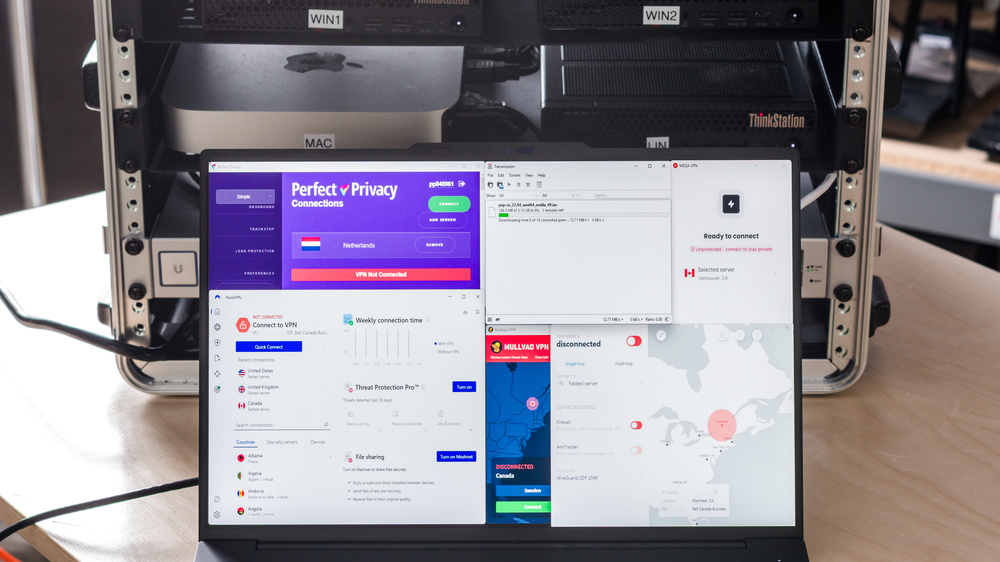If you frequently torrent, using a VPN (virtual private network) service might be a good idea. While the BitTorrent protocol itself is legal, the term 'torrenting' has become virtually synonymous with downloading copyrighted media, like movies, games, and TV shows. Depending on your local jurisdiction, downloading copyrighted content for personal use may or may not be illegal, and even if it's not criminal, there's a chance the copyright holder could pursue civil action. While we can't condone illegal downloading, if privacy and anonymity are important to you, a VPN can help by preventing your ISP (Internet Service Provider) from monitoring your activity. Without a VPN, your ISP can see all of your online traffic and send you warning letters or forward your personal information to authorities or copyright holders if they see you're downloading copyrighted material. A good VPN service will simply trash those requests.
With that in mind, no VPN service can guarantee complete anonymity, and it's important to be aware that it's impossible to verify what a provider really does with your traffic. A VPN should be one tool in a multi-layered approach to online security. To learn more, check out our article on VPN privacy.
But how do we test VPNs? Our team of experts evaluates each VPN using the same standardized test bench to ensure fair and unbiased product comparisons. We subscribe to every service we test with our money and have complete editorial independence. See how we test VPNs and judge for yourself.
We've tested 20 of the best VPNs for torrenting on the market, and our picks are below. We've verified that all of them work when downloading torrent files. If you want to learn more about kill switches, check out our R&D article. If you're on a budget, check out our recommendations for the best cheap VPNs and best free VPNs.

In 2025, we published reviews for 20 different VPN services. These reviews came after months of research, test development, and collaboration between our engineers, testers, writers, photographers, and editors. Our process for each review involves a lot of work behind the scenes, including rigorous checks and balances along the way, all to provide the most accurate and useful test results to allow you to make the right purchasing decisions for your needs.
-
Best VPN For Torrenting
 Torrent9.1Private Browsing9.1Policies & Practices9.2Security8.6Speed8.6Email Required:NoTorrent (P2P):YesSee all our test resultsData Limit:N/A
Torrent9.1Private Browsing9.1Policies & Practices9.2Security8.6Speed8.6Email Required:NoTorrent (P2P):YesSee all our test resultsData Limit:N/AMullvad is the best VPN for torrenting that we've tested. As a company, it's well-regarded for its transparency, privacy practices, corporate governance, and approach to digital rights. Mullvad has an unusual registration process where, instead of creating an account with an email address and password, you get a random account number, which you use as your only login credential. This means that none of your personal information can be tied to your IP address, so even if law enforcement gets hold of their customer data, they'll only see the random account numbers. You can use various payment options, including cryptocurrencies and cash in the mail. It also has a flat-rate pricing model of €5 (~$5 USD) per month, no matter how long you subscribe.
Underneath its intuitive interface, it's built on strong technology that can help keep you anonymous while you torrent. It effectively keeps your IP address hidden from third parties like your ISP, and it has a functional kill switch that prevents unencrypted data from leaking outside the tunnel in case your device restarts or the client crashes. On top of its base functionality, it comes with some handy features. Obfuscation can help you get around censors that block access to websites and services that disallow VPNs, and DAITA (defense against AI-guided traffic analysis), which makes it harder for third parties to find identifiable patterns in your encrypted traffic. It's not all upside, however. Mullvad doesn't support port forwarding, which can increase the number of peers you can connect to, potentially increasing how fast your torrents download. Also, while it supports split tunneling, you can only disable the VPN for certain apps, and you might miss being able to configure only your torrent client to go through the tunnel while the rest of your traffic is unencrypted. If you need these features and more, check out our pick below.
-
Best VPN For Torrenting With More Features
 Torrent8.9Private Browsing7.5Policies & Practices6.3Security8.6Speed8.4Email Required:NoTorrent (P2P):YesSee all our test resultsData Limit:N/A
Torrent8.9Private Browsing7.5Policies & Practices6.3Security8.6Speed8.4Email Required:NoTorrent (P2P):YesSee all our test resultsData Limit:N/AProton VPN is your next best choice if you're looking for more features than our top pick. Like Mullvad, Proton has a strong reputation for privacy and transparency. It also includes some convenient extras that Mullvad lacks. You can connect up to 10 devices simultaneously, and it offers servers in over 100 countries. This extensive server network allows you to choose one closer to you for a better connection.
Proton VPN supports port forwarding, an essential feature if you want to connect to peers who don't have any ports open, likely increasing how fast your torrents download. You can also enable split tunneling for certain apps, like your torrent client, so you can only have your torrent traffic going through your VPN while the rest of your device's traffic remains unencrypted. Like Mullvad, Proton also includes obfuscation, making your VPN traffic harder to detect, an integrated ad blocker, and a 'Secure-Core' feature that routes your traffic through Proton's own secure servers before reaching your selected country server.
However, Proton VPN isn't without drawbacks. Its latency performance can be disappointing, which can noticeably affect responsiveness, particularly for activities such as gaming. Price-wise, Proton VPN is significantly more expensive than Mullvad if you pay monthly, but it's a few bucks cheaper if you buy a one-year or two-year subscription. It's a good pick if you need those extra features, but if you don't (or aren't sure), you're better off going with Mullvad.
-
Best Free VPN For Torrenting
 Torrent8.3Private Browsing4.3Policies & Practices0.5Security6.2Speed7.2Email Required:NoTorrent (P2P):YesSee all our test resultsData Limit:N/A
Torrent8.3Private Browsing4.3Policies & Practices0.5Security6.2Speed7.2Email Required:NoTorrent (P2P):YesSee all our test resultsData Limit:N/AHotspot Shield Free is the best free VPN for torrenting we've tested. You can easily download the client from their website and start using it without creating an account. This means there's no personal data tied to your IP address when downloading or using the software, so it's well-suited to protect your identity while torrenting. Unlike many other free VPNs, it has no data limits and provides decent speeds with the Wireguard protocol, although it typically maxes out around 100Mbps. You can install and use it on as many devices as you want because it can't identify you or your devices with a login. That said, its kill switch isn't reliable, meaning it leaks some unencrypted traffic if you restart your device or after a software crash, so it's important to take appropriate additional security steps, like binding your torrent client to the VPN connection. It also lacks transparency and an affirmative stance on digital rights compared to our top picks and has an opaque corporate ownership structure. If that's not important to you, this VPN does the trick.
However, if you want a VPN with better transparency and a stronger privacy track record and don't mind a monthly data limit, Windscribe Free is the better alternative. It's an independently owned service boasting a solid reputation and an active community. Creating an account with an email address grants you 10GB of data per month, or you can opt for a username-only signup for 2GB per month. You can also access servers in ten countries, more than Hotspot Shield Free's three.
Notable Mentions
-
NordVPN NordVPN:
NordVPN is one of the biggest and most recognizable VPN services on the market. It offers loads of extra features, much like Proton VPN, but also multiple tiers with password managers, cloud storage, file sharing between your devices, and more. It's not as secure as our top picks since its kill switch doesn't work properly, and it's more expensive if you pay monthly. You have to pay for a year or two upfront to get the best prices.
See our review
All Reviews
Our recommendations above are currently the best VPNs for torrenting. We only recommend VPNs with a clear and digestible privacy policy, a proven track record of protecting their customers' privacy, transparency about their ownership, and acceptable security and speeds. We also factor in price (a cheaper VPN wins over a more expensive one if the difference isn't worth it), user feedback, and community reputation.
When choosing a VPN, consider what you need it for and understand its limitations. Depending on your risk profile, always using one is probably unnecessary. Modern websites, browsers, and devices have ample built-in security measures to protect you from the most common threats. With that in mind, here's the list of all our VPN reviews.















